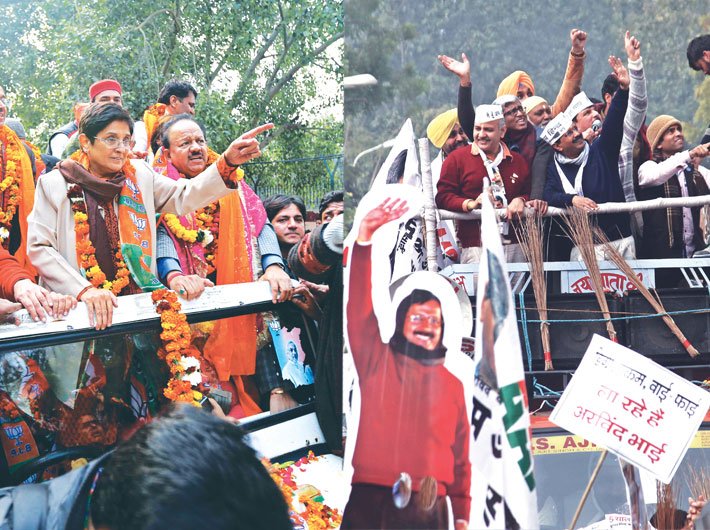The capital is going to polls on February 7 and Kiran Bedi has changed the rules of the game
The game is conventional and there are two unconventional players in the field. Delhi is going to vote again on February 7.
The last assembly election in December 2013 was different in many ways. An outsider, a non-politician, someone representing civil society and crusader against corruption, had contested against the odds of a traditional election.
The Aam Aadmi Party (AAP) of 2013 surprised the traditional political parties and laid claim to their support base. Everything was unconventional about it. From the way tickets were distributed to the way elections were fought.
The party and its chief ministerial candidate Arvind Kejriwal projected a strong alternative in a three-cornered fight in Delhi.
The election results in December 2013 stunned the governing party and forced the BJP to sit in the opposition.
Since then, Delhi politics has certainly changed with a new government at the centre. Narendra Modi’s arrival in Delhi has revitalised the BJP. Now, the rules of the electoral game are being rewritten with the induction of Kiran Bedi by the BJP.
Once fighting for the same cause, Kejriwal and Bedi are now standing at two ends, fighting against each other.
Both left their careers (civil services); established NGOs and have received the Magsaysay award for their work. Once considered strong faces of the Anna Hazare and India Against Corruption (IAC) movement, the two certainly have a lot in common.And in this conventional elections the BJP has injected an unconventional factor in the form of Bedi.
Kiran Bedi has given new life to the party in Delhi. Though, some see this as a face-saver act and a traditional way of putting the best foot forward to win election.
“BJP chose Bedi over other leaders of the party because they were not considered good enough (to compete). Thus, they brought an outsider of the BJP or RSS camp,” says Jagdeep Chhokar, a founding member of Association of Democratic Reforms (ADR).
Comparing Bedi with other politicians, Chhokar says Bedi is neither an outsider (in true sense) nor does she represent civil society. He says through regular tweets she was preparing her road to enter the party.
“The election this time is different because Delhi, in general, is different. It largely has urban voters. It is a very compact city-state. And also we have a party here which does not have presence in other states,” explains Sanjay Kumar, professor and director at Centre for the Study of Developing Societies (CSDS).
The unconventional way of bringing an outsider to connect with people at large is quite evident. But it cannot be really seen as a long term change in Indian politics, says Kumar. “It is not that people want any new kind of politics. There was a strong notion in 2013 election. Corruption was a big issue and the price rise was also disturbing people. AAP came forward as a strong alternative. But today it is being operated as any other traditional or older political party.”
He says the chief ministerial candidate of BJP may be termed as an outsider but elections are largely fought by mainstream leaders.
Anjali Bhardwaj, an RTI activist and a member of Satark Nagrik Sangathan and NCPRI, says the founders of AAP have been engaged with civil society and after that they have become mainstream political force to reckon with. “So the other older political parties are looking for ways to tackle them in the electoral space perhaps that is the reason BJP brought Kiran Bedi, ensuring that it would be far more difficult for Arvind to attack her. As she is portrayed as someone who is clean, very similar to how Kejriwal is portrayed.”
AAP was a non-traditional party but only in the election of 2013. Today it is fighting like any other political party and it is evident from the way candidates are selected, she says.
Pointing at the larger problem of the personality driven elections, Bhardwaj says despite two strong faces from civil society at the helm of affairs, the entire focus has been shifted from real issues; and all parties are well aware about it.
“The real issues on ground remain the same. Both Kejriwal and Bedi represent civil society but unfortunately we are not hearing about any road map from them. How they are going to enhance transparency and combat corruption? It is convenient for the parties to make a personality driven elections rather than talking about real issues.”
“With a personality driven campaign you can run far till a point. But ultimately the political parties will have to answer the real issues – problems of ration and pension, how the corruption will be abetted, bringing in the system of accountability and transparency.”
Ultimately, the BJP may not face any difficulty in capturing Delhi and forming the government.
But the colour of the political discourse will be an interesting aspect of this elections as two unconventional actors are currently occupying the centre stage.

